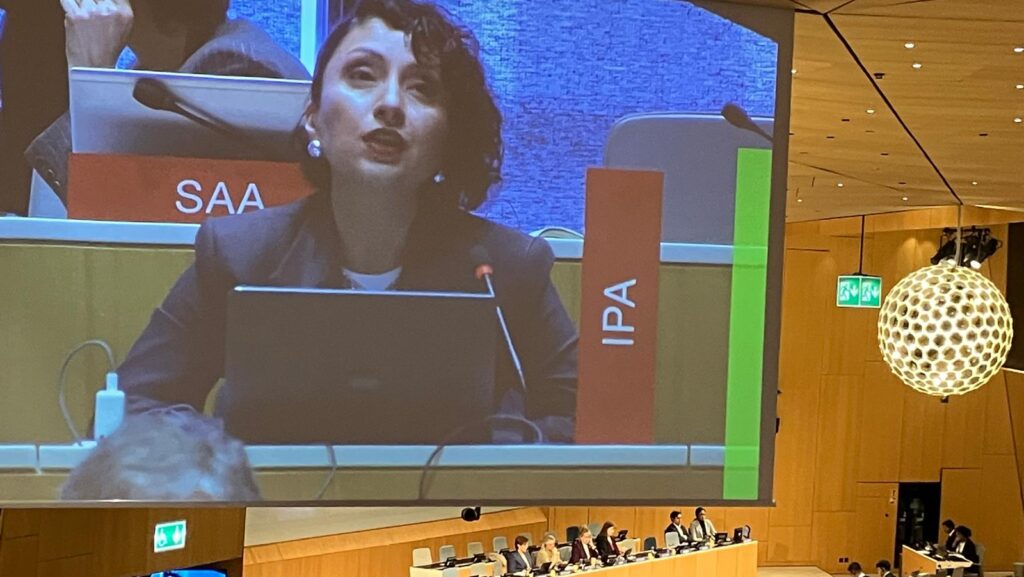Member States continued their statements on the topic of Limitations and Exceptions with a large number of delegations taking the floor. There was recognition of the work done so far, reminders of the original mandate and previously adopted documents, as well as re-iterations of positions in favour or against normative work. The delegate from Cameroon attempted to cut through to the chase, acknowledging that this issue is complex, and encouraging the Member States to overcome the complexity to achieve the mandate accorded by the General Assembly which is to conjure language (either a treaty, or other legal instrument.
The observers were then invited to take the floor with the many little green lights on the microphones instantly showing the keen interest among them.
IPA President, Gvantsa Jobava took the floor to recall IPA’s belief that the current international framework is sufficient. With the freedom to publish increasingly challenged in many regions and AI creating uncertainty, she urged Member States to stand firm in their support of the cultural and creative sectors. You can read and see her full intervention below.
In contrast to previous sessions, the split in observer voices in favour of an international treaty and those against normative work seemed more balanced, and complemented the sense, expressed by some Member States, that such range of views in the room will require deft skill and creativity to navigate.
In that vein, the Chair invited Member States into informals. The informals format means that, while the observers can continue to follow discussions from a hushed plenary chamber, no reporting on discussions is allowed.
Mum is the word.
The lunchtime side event was organised by the World Association of News Publishers (WAN IFRA) and the Italian Federation of Newspapers and Magazines Publishers (FIEG). Under the title News publishing and Artificial intelligence: risk or opportunity? the session was a whirlwind overview of the interactions between AI and news media so far, the licensing agreements concluded, the legal frameworks in many countries, the different international court cases involving news media and also a competition perspective from South Africa.
Informals continued throughout the afternoon running until close of business. We will have to wait until tomorrow’s summary in plenary to report on any outcomes from the informals.
The day concluded with the second side event of the day, Beyond the credits: Strengthening Audiovisual Authors’ Rights organised by the International Confederation of Societies of Authors and Composers (CISAC) and the Society of Audiovisual Authors (SAA), which we will report on tomorrow along with our own side event Who is writing? Rights and responsibilities in an AI-powered world delivered by publisher and well-known AI expert Peter Schoppert from Singapore.
And with that, delegates drifted out of the WIPO buildings into the cool Geneva twilight.
Alice: Would you tell me, please, which way I ought to go from here?
The Cheshire Cat: That depends a good deal on where you want to get to.
Alice: I don’t much care where.
The Cheshire Cat: Then it doesn’t much matter which way you go.
Alice: …So long as I get somewhere.
The Cheshire Cat: Oh, you’re sure to do that, if only you walk long enough.
IPA President, Gvantsa Jobava
Statement, Exceptions and Limitations, SCCR 46
Thank you, Chair,
Congratulations on becoming chair and thank you DDG Forbin and the WIPO secretariat for their work.
We welcome the ongoing discussions over Limitations and Exceptions, and the work done so far to present the issues at stake to Member States. We still believe the existing international legal framework provides sufficient flexibility to adapt local legislation to satisfy a range of needs.
At a time of ongoing attacks on publishers’ freedom to publish across the world and while creators and publishers are experiencing uncertainty linked to the roll out of Artificial Intelligence, there is no need for language that would lead to a legal instrument of any kind. This would undoubtedly constitute a serious blow to the creative industries, especially those engaged in the educational field.
This is my first SCCR as President of the IPA. We will continue to engage constructively in all our discussions this week and urge you all to stand firm in your support for the creative and cultural sectors.
Thank you

